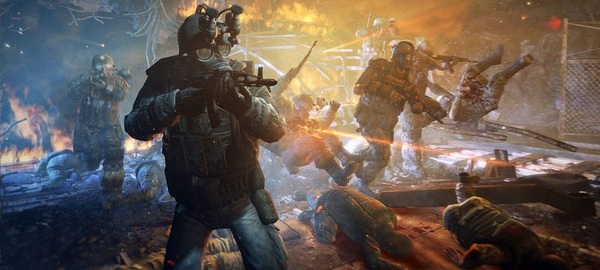Our dear friends over at PCGamesHardware.de have interviewed 4A Games, and came up with some interesting details about the PC version of Metro: Last Light. According to Oles Shishkovtsov, Chief Technical Officer at 4A Games, Metro: Last Light’s DX11 API offers 15% improvement over its DX9 API (provided you use the same settings).
Oles Shishkovtsov also shed some light on the various PhysX and tessellation modes. According to Oles, AMD users will be able to run all PhysX physics via their CPUs. Naturally, they will need a high-end CPU to do that, however there won’t be any exclusive PhysX effects to Nvidia users.
As Oles noted:
“Some things are obscenely well parallelized and thus it is difficult to achieve the performance of a 2.0 TF graphics card with a 0.1 TF processor.”
Regarding tessellation, Metro: Last Light will feature two modes; one that enables tessellation for particular objects and one that affects everything. The performance difference of these two modes is around 15%.
Unfortunately, DX10 users won’t be able to enable POM, an effect that was supported by some DX9-only titles. As Oles stated, the DX11 will be supporting exclusively POM and Tessellation, though the DX10 version will be faster than DX9 (and will support all other graphical features).
Metro: Last Light will also support SSAA (super-sampling anti-aliasing). The default AA method that Metro: Last Light will support is called AAA; a method that has been conducted along with FXAA to achieve more control per pixel in order to better adjust the blur and sharpness. This method is enabled by default (there won’t be a way to disable it), and 4A Games will offer players the ability to enable SSAA.
Surprisingly enough, Oles stated that MSAA is as good as dead at this point:
“For those who are interested: An Ordered or rotated grid is great for all vertices which occur in the pixel grid when the box filter is used. If you use something more sophisticated as we (FXAA), then the filter is no longer able to cover the grid in the correct orientation – which means a substantial loss of quality. Although a slight rotation of the image from a qualitative point of view is very good, it takes a lot of power and storage space. So be it, traditional MSAA is dead – Edge smoothing is the responsibility of the programmer and not a magical hardware feature.”
Metro: Last Light is currently scheduled for release to the PC and current-generation consoles on May 14th in North America and May 17th in Europe.
John is the founder and Editor in Chief at DSOGaming. He is a PC gaming fan and highly supports the modding and indie communities. Before creating DSOGaming, John worked on numerous gaming websites. While he is a die-hard PC gamer, his gaming roots can be found on consoles. John loved – and still does – the 16-bit consoles, and considers SNES to be one of the best consoles. Still, the PC platform won him over consoles. That was mainly due to 3DFX and its iconic dedicated 3D accelerator graphics card, Voodoo 2. John has also written a higher degree thesis on the “The Evolution of PC graphics cards.”
Contact: Email

